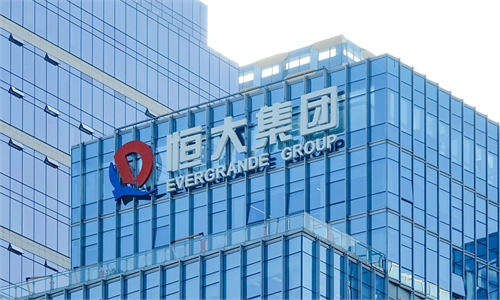COMMENTS / EXPERT ASSESSMENT
Advanced tech and infrastructure, not housing, will drive long-term growth

Illustration: Xia Qing/Global Times
China's property development climate index compiled by the National Bureau of Statistics stood at 100.62 in October, down 0.12 points from that of September and remaining at a moderate developing range.Discussions about the development of the Chinese real estate sector have been taking place across the globe, especially after industry giant Evergrande Group plunged into a liquidity crisis. It seems that foreign media outlets and politicians are intending to take the chance to find something that might "go wrong" with the Chinese economy.
After decades of high-speed growth, it is true that the real estate industry's power to boost economic surge has become less pronounced. Leading players in the sector have been seeking business transformation or diversified development, such as investing in infrastructure construction and new energy vehicles (NEVs) production.
Declining birth rates, policies and regulations, shrinking cash supply from financial institutions, industry life cycle, as well as the ongoing COVID-19 pandemic have all played a role in slowing growth across China's housing market.
However, that doesn't mean the market is falling apart or something has gone wrong with Chinese economy. Given the colossal size of China's real estate industry, it will continue to play a vital role in China's economic development under proper regulation.
Market fluctuation in the sector may give rise to cyclical risks, but will not cause any systematic risks for China's financial system, as suggested by many foreign media outlets.
Putting aside elements of political ill-will, foreign investment companies have offered a more honest assessment. Goldman Sachs Asset Management was cited by Bloomberg as saying that "fears of Chinese real estate debt are overdone," and the company has been adding a "modest amount of risk" through high-yield bonds issued by Chinese property developers and denominated in US dollars.
In fact, China has been rolling out measures to manage the risks in the real estate sector under the principle of "housing is for living in, not for speculation."
A much more vital question is what will become the main driving forces for China's economic growth. Advanced technology and infrastructure are growing in influence and stand ready to boost the next round of economic expansion in China.
Taking the semiconductor sector as an example, China has been importing unrivalled amount of chips annually. In 2020, the country imported over 2.4-trillion-yuan ($376 billion) worth of semiconductors, which was nearly double the size of oil imports for the same period, according to media reports.
With years of investments in the semiconductor production, it will gradually consolidate into a major source of domestic economic output, contributing greatly to GDP growth.
In addition, China's rapid development in 5G network, artificial intelligence and other advance technology will in turn boost the demand of semiconductors and hardware devices.
In the meantime, challenges remain ahead, including declining private investment amid the pandemic that could last for at least three years. Under these circumstances, it is crucial to keep investment at a proper level, and infrastructure will be an ideal area to increase investment. For instance, tourism infrastructure could be one major area promoted to accommodate a rapid resumption of the tourism industry after the pandemic.
The huge potential for infrastructure construction, including new infrastructure projects such as 5G stations, big data centers and Internet of Things fields, will strongly support the long-term sustainable growth of the Chinese economy.
The article was compiled based on an interview with Gao Liankui, dean of China economic research institute, Business School Netherlands. bizopinion@globaltimes.com.cn



